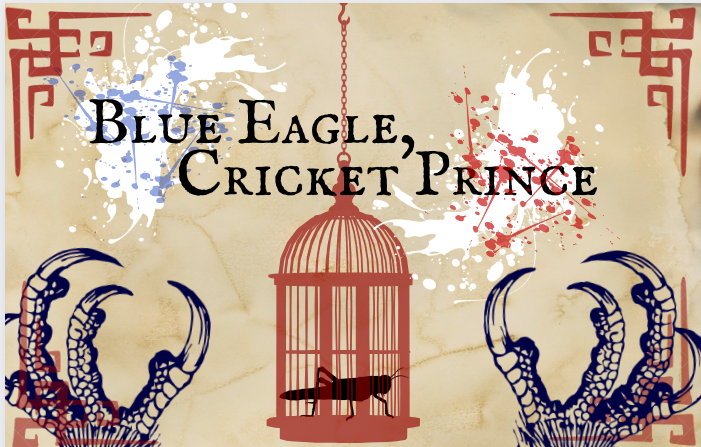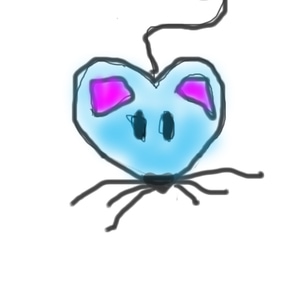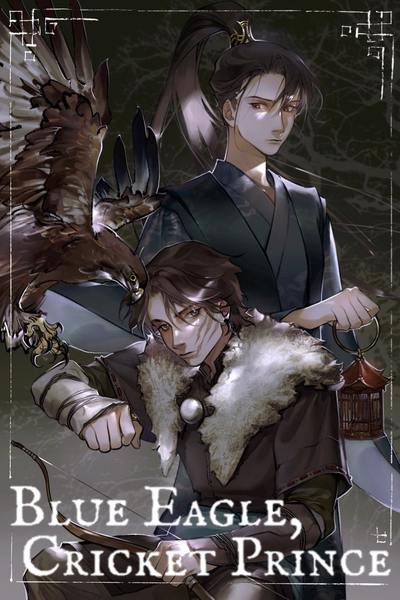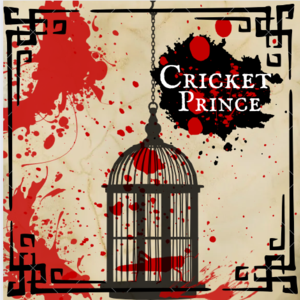Zhisen came to with throbbing headache and opened his eyes to thin firelight struggling against the weave of a piece of fabric. There were many voices talking around him, mostly men, but he heard two or three women. It was all Erdeni, several dialects, and once he was awake enough, he managed to parse through— Chief Tolon was in the yurt. It was probably a yurt? He did not feel any wind at all, and wiggling his hands revealed that the rope binding them was secured to the back of the chair. Zhisen wasn’t sure whether to laugh at the situation or at himself for thinking it was a decent joke to say he was fine being tied up, but he supposed he had more important things to worry about. He wet his lips while thinking of what to say.
Someone said, “He’s awake.” Everyone fell silent.
Zhisen tried for a polite smile. “I’m not sure in which direction to incline my head, but I humbly offer my most respectful greetings, Chief Tolon. And company.”
The roughest voice he had ever heard in his life answered. “So, it’s true then, that he speaks our language.” Zhisen wondered if it really was that shocking. “You know it better than your father.”
“I am flattered.”
There was a brief silence, as if everyone was expecting him to ask to be untied, but Zhisen did not particularly feel the need for that, since they had not tied the ropes tightly enough to hurt. But since nobody else spoke first, and he could feel someone— probably Tolon— looking at him with a bit too much intensity, he decided to talk. “I gather your son told you already why I came all this way.”
“It strikes me as foolish of you to believe that I won’t kill you. If you are so willing to betray your people, why should I trust that you would not betray mine once you have what you want?”
Zhisen chuckled. “I know very well that I could not conquer the steppe even as emperor. What cause would I have to betray you later on? Do you think I want to cut a hole in my purse?” He paused when the reply was not immediate, adding, “The only certain route to victory is to start by killing you, then kill every other chief and all their sons and daughters. But to make every person living on this steppe hate me, to let them lose what they have? Well, people with nothing to lose are the hardest to defeat. Besides, if I hope to govern a prosperous empire, I should seek a long-term treaty with your son. I can’t imagine he would agree to such a thing if I murdered you.”
The quietude was satisfying. Nobody seemed to draw blades, but Chief Tolon said with some amusement in his voice, “Your reputation for your silver tongue precedes you, yet you speak so bluntly.”
“Talking of war leaves little room for poetic analogies.”
“It seems to leave room for jewellery, though.”
“I have heard that you wear several rings and precious stone beads in your hair.”
At that, Chief Tolon laughed. “Well. It does not become a prince to dress like a pauper.”
“I thought you might say that, and so I took precautions.”
“It does not exactly become a prince to look for allies in his foes, too.”
Zhisen shrugged. “I came here more in the capacity of a tactician than a prince. Besides, are we foes? You and I? Me and all of you? Do we have some personal qualms, or are we merely on the opposite sides of a nonsense war? Must we fight just because the Jirandai court seems to think it would be nice to conquer the steppe, which is hardly hospitable for towns and cities? For what would we use it? For what do we need it? Why should we worry about paying tribute to you, when it would not be so difficult to acquire more wealth from external sources and continue to do business with you? And on your part, why raid our border when it only causes bloodshed? Why lose people and resources for things we could trade peacefully?” Zhisen paused. “But I know why. My forefathers have wanted to chase you till the ends of the earth to own the Taaga Mountains, to mine more gold there. Your forefathers have wanted to squeeze the gold out of my people until they are squished flat— without thinking that there will be more gold to squeeze if we could cooperate about Taaga. But why should we continue to fight? Is there a good reason? Name it.”
Another man spoke. “You talk like the Crown Prince.”
“I am honoured.”
“He was a fool,” the same man said, but Zhisen did not particularly care. “We cannot live in peace with each other. There is too much blood flowing across our border. It is not a—”
Zhisen cut him off. “And do you think that continuing to fight will give that blood a chance to stop flowing?” The man did not answer him angrily. “If that is our reason to fight, then we will fight until there is nobody left on this side of the mountains. We will die men full of hatred. Our families will die full of hatred. Our children will grow up full of hatred. Our lands will be drenched in blood and spite. If that is the world we are forging, what use is it to live on that land, polluted with suffering? Spare me that drivel. You may revile my father— I understand. You may revile our soldiers— I understand. You may revile me for my lineage— I wish it not to be so, but I understand.” He paused again. “But do you revile your wives? Your sons and daughters? This steppe? It seems that you must, if you wish to avenge blood with blood.”
A scoff, from Inalchi. “You are full of pretty words.”
It was Togene who answered him. “Have you ever said this to your father, Prince Zhisen?”
“I cannot count it even on the incense sticks at a temple, how many times I have said it.”
“And despite his famous affection for you, he does not listen?”
Zhisen laughed. “He does not take me seriously because of that affection.”
It was Khojin who spoke next. “Do you want to trade with the Western Kingdoms?”
There were some questions and noises of confusion, abrupt as he was, but Zhisen found himself relieved, and smiled. “It’s my intention to bolster our trading fleet, and to build a proper road through the steppe to the southern pass through Taaga. That way, we can maintain this system of tribute, augment it with peaceful trade, and continue to grow economically. But I will only tell you my plans if we are allies.”
He was right to believe that Khojin was his best bet, for he said, “Father, consider it.”
Chief Tolon sounded a bit surprised. “Do you believe him, Khojin? Why?”
“He came here under the guise of negotiating peace with us before the Jirandai launch the first offensive of a real war against us. That is what he told the court. It must have taken him a fair deal of energy to make them agree to his coming alone. When he was on the road, Inalchi ambushed him but he did not strike even once to wound— though he might have done it, I am sure. And now he is sitting bound and blind; yet, knowing that his head might roll at any moment, he leans back in the chair calmly.”
Since nobody answered him, Khojin added, “Maybe he is too stupid to have a sense of danger, but a stupid man does not talk like he does.” After a pause, he went on, “A stupid man would not have been able to calculate the best moment in battle to aim his arrow at me, and create that moment, either. I am not saying we should trust him, but I agree with what he has said. If there is a way out of a long war, we should consider.”
“If I may interject?” Zhisen asked. They waited. “If you decide to kill me, Chief Tolon, please let your son do it. It seems I would thus have the best chance for ‘quick and painless.’”
At that, a woman laughed— Togene, it seemed. She said, “You’re insane. Father?”
There was some quiet. Eventually, after what must have been some deep thinking, he spoke again, after a sigh. “Let us hear your plan, Prince Zhisen. If we are not persuaded, I will let you choose whether you ride back to the palace to be executed for treason, or whether you want to be executed here.”
“Your generosity is boundless,” Zhisen said, and having been picking at the ropes binding his wrists throughout their entire conversation, he finally untied them. The binds thumped to the ground, and he lifted his hands to untie the blindfold. Everyone was staring at him in shock, even Tolon. He chuckled. “I thought to save you the trouble of untying me yourselves. I hope that is not too bold of me.”
Khojin was the first to snap out of it, with a huff of laughter. The ravines on the north coast, drawn there on the map, looked like the scars on his cheek, darker in the light of the torches around them. Khojin gestured at the inked lands and told him, “Go on. I’d rather not stain my sword with your blood.”
Getting to his feet, Zhisen said, “That’s very kind of you.”
Since nobody laughed, but he had the attention of every man in the room, including Chief Tolon with his bear-pelt-cloak and eyes like hardened pine resin, Zhisen began.













Comments (1)
See all